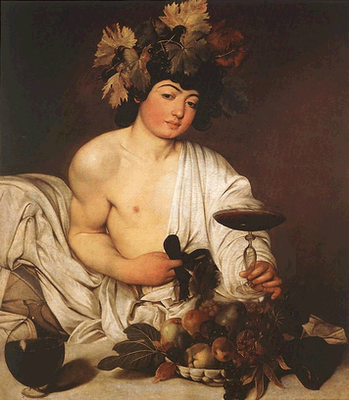Meet Dionysus, otherwise known as Bromius, otherwise known as Evius, otherwise known as Bacchus. His many aliases confirm his identity as the “masked” god, as is shown in The Bacchae (see: The Plays). His other traits identify him as the effeminate god (see: Male and Female), the god of ekstasis, the god of enthusiasmos, the god of theater, and Eluetherious, which means “the liberator”. All of these qualities are important when considering the relationship of masks and their use in Dionysian theater.

First, let’s examine the quality of Enthusiasmos. Enthusiasmos, where we get our modern word for enthusiasm, means to “have the god inside of you”. In the case of Dionysus, this is most likely referring to wine. The Ancient Greeks believed that the effects felt from drinking wine were a god inside them, altering and freeing them; thus, the liberal quantities of wine consumed at the Dionysia. Dionysus was the great liberator through wine and he would free men of their inhibitions and their very selves. Even in today’s culture you will often hear people apologizing for “not being themselves” after a night that would make Dionysus proud.
The wine affects not only inhibitions, it also affects sight. This creates a phenomenon of doubling, which is interrelated to masking. A person who has consumed to much wine “sees double”, referring to the blurring of vision induced by alcohol. The word “proposon” was used in ancient Greece to describe both face and mask, so to wear a mask is to literally double your face. In today’s modern English a person who pretends to be something they are not is often described as “double faced”. It is vital to understand the links between wine, masking, and Dionysus because the audience of Greek Tragedy would definitely be experiencing the physical and psychological effects of all three.
The next characteristic under examination is Ekstasis. Ekstasis, the root of the word “ectasy”, is the experience of emotion to the extreme, like ecstasy or madness. This is the phenomena of feeling something so strong that you are outside yourself, for example, “Berserker rages”. Performance is very akin to this experience, because you must not be yourself in performance. In some ways the mask is the physical representation of this phenomenon.
If we view performance as the ability to draw another identity out of ourselves through the experience of emotion, then the mask represents, or at least assists this process. In essence you are taking your persona out of your consciousness and finding “the other” within to exhibit in performance, symbolized by the mask. In this case the mask becomes the mediator between your interior self and this new character being created with the mask.
In Dionysian Theater there were no professional actors. All plays were performed by chosen Athenian citizens (again, ALL MALES). Those who were chosen would have to play anything from a hero like Herakles, to a Danaid, to a Satyr, to a powerful woman like Clytemnestra, to the half-cow/half-woman Io. These masks would serve as neutral mediums through which the actor transforms into this character and still retain their identity. Greeks took their masks at face value and never expected the actor to be unveiled at the end, which allows the actor to feel free in the knowledge that he is only what he creates and thus liberated from his persona. All this is important because of the nature of mimesis. Because the actor can stay unrevealed, not only is he liberated, but the audience has the ability, by imagination, to create something better than the actor. Aristotle believed that the act of mimesis was more than just imitation, but also an improvement on reality. He was a proponent of “perfection through aesthetics”. Thus the man can be something greater than himself and the audience can believe the actor is something greater, because they never witness the man behind the mask.
Thus, the mask's identity as a mediator in 5th century Greece is ever present in its religous basis.
